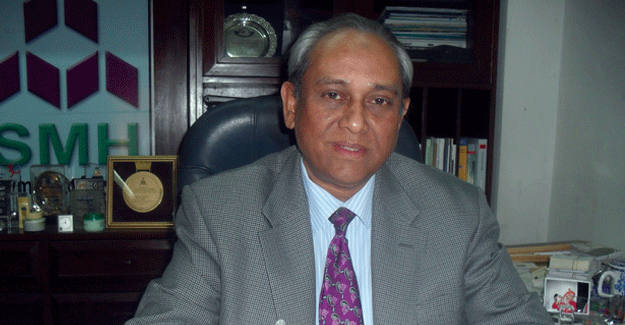
The government must play a proactive role to ensure Bangladesh's supremacy in apparel trade over the decades
Syed Mozzam Hossain, Chairman of SMH New Generation Apparels Ltd, is highly respected by the business fraternity for his business diligence and ethical practices. Syed Mozzam has over the years, established a well diversified group, with businesses including engineering, agro, power, etc. In an interview with Textile Excellence, he discusses the important role that the government needs to play to help the industry's growth prospects.
What is the status of the Bangladesh textile and apparel industry in the economy?
Bangladesh has emerged the second largest apparel producer and exporter. It is the backbone of the country's economy, and serves the important economic objective of providing employment to millions of workers in a populous country. Apparel manufacturing has traveled across the globe, in the last many decades - from UK to Turkey, to India, China, and now Bangladesh. In the next 20 years, it could become an important industry in Myanmar, etc. Bangladesh has grown to become the second largest apparel exporter mainly because of dynamic entrepreneurship, combined with highly intelligent workforce, comprising mainly of women.
How have the recent industrial accidents in the country impacted the textile and apparel industry?
These accidents have been detrimental to our image. These unfortunate incidents have captured the attention of the world media, and we have been tagged with poorly managed factories, with entrepreneurs who are not interested in fire and building safety. This is not true. Tazreen and Rana Plaza were stray incidents, but the entire industry is now made out to be non-compliant. Now, the Alliance and Accord groups, along with various government agencies, are working closely with the industry, to ensure that the industry is compliant with social, safety, environmental standards. I strongly believe that these compliances that brands and retailers insist upon are very important for sustainable growth of the Bangladesh industry.
What role does the industry expect the government to play to ensure long term growth of the industry?
Developing and providing infrastructure is an important role that the government must undertake, unfortunately, it is not providing land or building to make our industry compliant. There is a huge gap between what the industry expects from the government, and what the government is doing. There are some industrial areas in some districts, but there are no industrial zones for garments specifically, apparel manufacturing is concentrated in Dhaka and Chittagong, both overcrowded cities, with spiraling land prices. For industrialization a country needs some specific industrial policy but this is overlooked by the government. In contrast, the Malaysian government has helped its industry to relocate and bore the cost of relocating not just within the country, but also outside the country.In Bangladesh, we know that relocation is absolutely necessary, but there is no specific guideline for relocation in Bangladesh. Relocation costs are invariably high, interest rates here are among the highest in the world.
Despite the odds, the textiles and RMG sector continue to grow. We want that the government also put an end to the political turmoil, which results in worker unrest, and consequently, production in factories suffers, hurting business. Politics should not be at the cost of the economy.Recently there was a huge political unrest in Thailand but the communication system was not blocked, business continued. The reverse situation prevails in Bangladesh and even the smallest political issue results in roadblocks, vehicles getting burnt down, factories are destroyed.It is the sheer diligence of the entrepreneur and the worker that we have progressed this far, and achieved this success, in the face of so many obstacles.
Which other sectors, other than RMG and IT, can become growth drivers?
The pharmaceutical industry has developed well in Bangladesh. Production is very high, and the world is the market. Bangladesh is a halal country, and halal food is a US$ 600-700 billion business.Apart from this, India, Bangladesh, Nepal, Sri lanka have opened up their markets. India has a huge population, and a big appetite for consumer goods and apparel. If we can develop road connectivity between Bangladesh and India, we will find a market in such close proximity that equals the size of Brazil, or Europe.
Where do you see the future of the Bangladesh RMG industry?
I am very confident about our growth prospects. Bangladesh remains the most cost competitive country in the world. We have become the second largest apparel exporter. If we can develop our infrastructure and build efficient supply chains, we can make the most of the opportunities emerging from the shift in global trade. Costs in China are going up, and that has already increased business for Bangladesh. However, China still has many advantages, Chinese factories have a one month lead time, while Bangladesh has a three month lead time. Turkey has emerged a favoured sourcing destination due to its proximity to Europe, even as Turkish prices are higher. So, improving our supply chain becomes very important. Bangladesh will remain a strong contender, and our politicians have an important role to play in ensuring the future of this industry.
Textile Excellence
If you wish to Subscribe to Textile Excellence Print Edition, kindly fill in the below form and we shall get back to you with details.












